
If you’re reading this post, you likely already know that he journey of foster care is not without its challenges. One such hurdle that can be particularly stressful for foster parents is navigating the court system. Court proceedings can be overwhelming, emotionally draining, and filled with uncertainty. In this post, I’ll share some reasons why court is so stressful for foster parents and provide actionable strategies to cope with the challenges they may face. Sound good? Let’s do this!!
Uncertainty and Emotional Strain:
Court hearings are often filled with uncertainty, as decisions regarding the placement and future of the child are made. Foster parents are deeply invested in the well-being of the child, and the prospect of potential reunification or changes in custody can evoke strong emotions. The emotional strain can be exacerbated by the lengthy legal process and the pressure of providing accurate and compelling testimony.
What you can do:
Seek support: Connect with other foster parents or support groups who have experienced similar challenges. Sharing your feelings and experiences can provide a sense of validation and relief.
Engage with professionals: Foster care agencies, social workers, and lawyers can offer guidance and support during the court process. Establish open lines of communication to stay informed and seek advice.
Navigating Complex Legal Procedures:
Courtrooms can be intimidating, especially for individuals unfamiliar with legal proceedings. Foster parents may feel overwhelmed by the complex language, formalities, and the presence of multiple parties involved in the case. Understanding and following court protocols can add to the stress and anxiety of the situation.
What you can do:
Educate yourself: Take the time to familiarize yourself with the court system and the specific laws governing foster care in your jurisdiction. Knowledge empowers you to ask informed questions, participate effectively, and feel more confident during the proceedings.
Communicate with your legal representative: Foster parents should maintain open communication with their attorneys. Share any concerns, seek clarifications, and discuss the best strategies to protect the child’s interests. An attorney can explain the process, prepare you for hearings, and advocate on your behalf.
Coping with the Waiting Game:
Court processes can often be slow, leading to prolonged periods of waiting for hearings and decisions. This waiting game can be mentally and emotionally exhausting for foster parents, as they strive to provide stability and support to the child amidst the uncertainty.
What you can do:
Focus on self-care: Prioritize self-care to help manage stress. Engage in activities that promote relaxation and well-being, such as exercise, meditation, spending time with loved ones, or pursuing hobbies.
Stay connected with your child: Maintain a nurturing and stable environment for the child in your care. By focusing on their needs, you can alleviate stress and uncertainty and provide a consistent source of support throughout the court process.
While court proceedings can be incredibly stressful for foster parents, it is crucial to remember that their involvement is vital in advocating for the best interests of the child. By understanding the stressors involved and implementing effective coping strategies, foster parents can navigate the court system with more confidence and resilience. Remember, you are not alone—reach out for support, stay informed, and prioritize self-care. Together, we can create a more compassionate and supportive foster care experience for everyone involved.
+ show Comments
- Hide Comments
add a comment